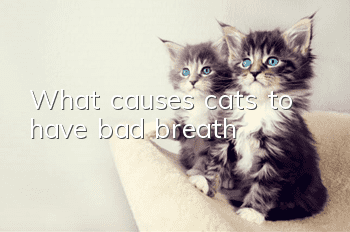What causes cats to have bad breath?

We often hear cat owners complaining to each other about their pets’ bad breath. In fact, this is understandable. For example, my two cats like to sniff everywhere and even lick my face. At this time, I usually feel like this.
I can’t feel the cat’s love for me at all, only the stench that is about to come out. But did you know that bad breath in cats can be a serious health problem? In this article, we’ll take you through the potential causes and treatments for bad breath.
What causes bad breath in cats?
Bad breath, medically known as halitosis, is a medical condition that can be observed not only in cats, but also in humans and dogs.
General causes of bad breath can be divided into two categories:
1. Oral and dental problems. These are the most common causes of bad breath in cats (just like ourselves). The bacteria that cause plaque and tartar to build up can release a disgusting odor. Additionally, inflammation or cavities in the gums or other oral tissues will almost always cause your cat's breath to become foul-smelling.
2. Non-oral reasons. While a cat's stomach or lungs, kidney disease, or certain viral infections can cause a cat's breath to smell stinky, these problems are uncommon. Due to the wide variety of such diseases, we will not go into details here.
IMPORTANT: If your cat has bad breath, remember to see your veterinarian. While trying to treat it at home can improve your cat's breathing, it rarely addresses the underlying cause.
What should we do when faced with cats’ bad breath?
If your cat's breath smells bad, you should first look inside his mouth. If you notice certain signs of illness, you can be sure that dental and oral problems are indeed the culprit:
1. Tartar accumulates on the teeth. These are the brown things on your cat’s teeth. Typically, the lower back teeth are most at risk.
2. Redness and swelling of the gums. Normally your cat's gums should be pink, but in cases of dental problems, the lines on your cat's teeth can turn red. This refers to inflammation, which can cause discomfort and pain in cats in addition to bad breath. Bleeding gums are also common.
3. Decreased appetite and changes in eating habits. If your cat's mouth hurts, he may be reluctant to eat (or even refuse to eat). You may observe this as your cat becomes hesitant, eats slowly, sometimes tries to chew food on one side of its mouth, or hesitates during meals.
4. Increased salivation. This also points to pain in the mouth. If he is uncomfortable swallowing saliva, he will hesitate, causing more saliva to drip out of his mouth. This may indicate a more serious condition.
If you don’t see any of the aboveThere are no signs that your cat's bad breath may be caused by something else. If you notice other symptoms, such as diarrhea, vomiting, or drowsiness, you should always seek medical help. These often point to very serious health conditions.
No matter what, you must go to the vet. Plaque is a very strong structure that consists of hardened plaque on your cat's teeth. You can't scrape it off with a toothbrush. Your veterinarian will use a special tool to scrape the tartar off your teeth, similar to how a dentist cleans your teeth.
Remember: Cleaning your cat’s teeth isn’t just about keeping them healthy. Any animal with teeth will benefit from a toothbrush. What's more important is that you can build a good trusting relationship with your cat. Although a cat is just a cat, they are your family!
Can I treat my cat’s bad breath at home?
There are a variety of products on the market today that can improve your cat's breath. The most popular are some dental treats, dental cat toys, and water additives that help remove some (only some) of the plaque from your cat's teeth and bring a fresh smell to your cat's breath.
But remember, these are not permanent solutions to bad breath. They just offer a convenient method, and the solution to the underlying cause is still taking it to the vet.
To use an inappropriate analogy, the problem of cat bad breath is like your cat pooping in the litter box. What can you do? The best way to solve the problem is to scoop it up. Alternatively, you can spray air freshener in the room, which may temporarily solve the problem. But if you don’t address the underlying problem, the problem will persist.
So, you should address the real cause of bad breath rather than giving a quick fix.
How can I prevent my cat from having bad breath?
When you work with your veterinarian to resolve a problem, you don’t want it to happen again in the future. Regardless of the underlying problem, be sure to use medication appropriately and with the advice of your veterinarian.
Because the most common cause of bad breath in cats is dental problems, brushing your cat’s teeth regularly is the most effective way to prevent bad breath.
If you love your cat, then you should brush his teeth every day, or at least three times a week (you can train the cat to cooperate slowly). Also, especially if you think you are too busy at work to have time. Then be sure to take your cat to the veterinarian for regular checkups.
Tell you: If you suspect your pet is sick, call your veterinarian immediately. For health-related questions, always consult your veterinarian as they have examined your pet, understand your pet's health history, and can advise you on the best treatment for your pet.
- Why do cats become less affectionate the more we keep them?
- What are the causes of dystocia in cats?
- What should I do if my cat is malnourished? How to improve it?
- How old is a cat in one month? How old is a cat in one month?
- Cat’s reaction after eating catnip
- What is the average lifespan of a cat? How old is a cat compared to a human?
- What to do if your cat has ear mites? Ear mites are contagious
- Why do cats like to poop with their owners?
- What causes patches of hair loss on kittens?
- Cat pregnancy precautions



